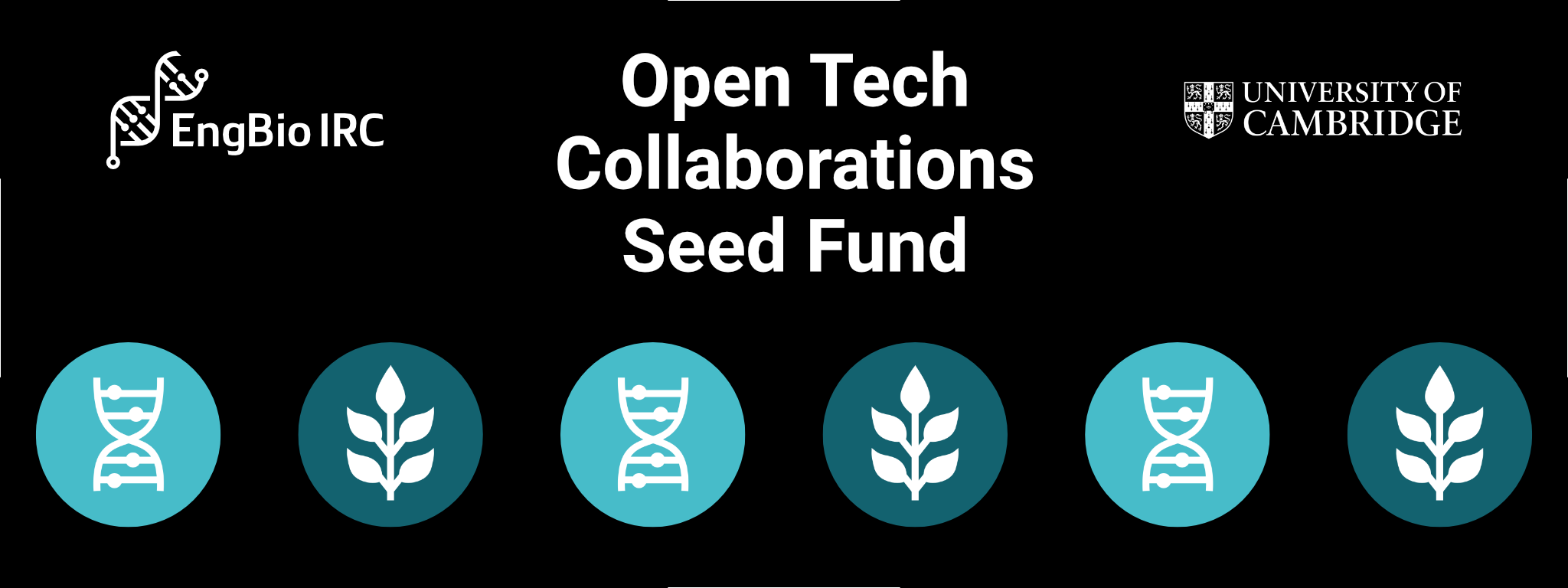
Submitted by Vicky Yee K Reid on Tue, 16/01/2024 - 11:38
The EngBio IRC is pleased to present the winning projects selected for the Open Tech Collaborations Seed Fund. Learn more about the four interdisciplinary projects that will be taking place over the next few months and the Cambridge researchers spearheading them.
In August 2023, the EngBio IRC released the Open Tech Collaborations Seed Fund as part of the project “Applying Open Tools & Resources: towards Accelerating Engineering Biology Innovation in the Cambridge”. The fund provides up to £2500 to support the further development and impactful application of open technologies in the areas of biomedical science and agriculture & sustainability.
Having received a number of exciting proposals, the EngBio IRC leadership team have now selected the following proposals.
New genetic tools to use Marchantia polymorpha as a platform for bioproductionLead Researcher: Dr. Facundo Romani (Dept. Plant Sciences) Team Members and Collaborators: Sze Wai Tse, Davide Annese, Eftychios Frangedakis. Prof. Jim Haseloff (Dept. Plant Sciences) Agriculture and sustainability. Development of open technologies. Marchantia polymorpha is a simple plant model that allows rapid transformation that can be scalable. It also has the potential to be used as a platform for plant-based production of highly valuable proteins or compounds. This project aims to expand an open toolkit of DNA parts tailored for bioproduction in Marchantia, using synthetic regulatory elements to modulate and optimise constitutive and inducible expression. |
|
An automated platform for human 3D lung modellingLead Researcher: Dr. Corrado Mazzaglia (Dept. Engineering) Team Members and Collaborators: Prof. Yan Yan Shery Huang (Dept. Engineering), Franck Courbon (Ethicronics Limited) Biomedical sciences. Development of open technologies. This project focuses on the development of an automated 3D human lung model in vitro, utilising cutting-edge 3D extrusion bioprinting technology. This innovative endeavour aims to revolutionise the way we study and understand lung biology and disease mechanisms. By creating a highly realistic and functional in vitro model of the human lung, we seek to provide researchers and clinicians with a powerful tool for drug testing, disease modelling, and personalised medicine applications. This project will build on our previously published open-source bioprinting solution.1,2 |
|
High throughput-parallel imaging of plant roots using a modular architectureLead Researcher: Olaf Kranse (Dept. Plant Sciences) Team Members and Collaborators: Dr. Sebastian Eves-van den Akker (Dept. Plant Sciences), Prof. Stuart Haigh (Dept. Engineering) Agriculture and sustainability. Development of open technologies. The Eves-van den Akker lab studies plant-parasitic nematodes - a global constraint to agriculture. A major bottleneck in the field is phenotyping of infected plants. To overcome this limitation, we have developed hardware and software to increase phenotyping capability and throughput. In order to facilitate wider adoption of this technology, we propose a new modular hardware design that could be adapted to the needs of any lab/experiment. We envision an open-source tool that will be applicable to many biological systems. |
|
Developing AI-powered and multi-spectral imaging to assess plant-parasitic nematodes for crop protectionLead Researcher: Dr. Victor Hugo Moura de Souza (Dept. Plant Sciences) Team Members and Collaborators: Arthur Mitchell (NIAB), Prof. Ji Zhou (NIAB), Dr. Sebastian Eves-van den Akker (Dept. Plant Sciences) Agriculture and sustainability. Development of open technologies. Plant-parasitic nematodes have a wide range of hosts covering many crop species in the world, impacting negatively on global food security and causing a loss of $100 billion per year. In this project, the team will focus on developing a cost-effective multispectral imaging device to acquire and detect plant-parasitic nematodes, which will be combined with genetic analysis studies of the plant host. The project will build on previously published work3 and incorporate multispectral image sensors into the system to screen and identify nematodes using AI-powered analysis. The project will enhance the capability to measure nematode number and growth patterns and facilitate mapping of plant susceptibility and resistance to parasites. |
Sign up to our newsletter to keep up to date with the latest news from the Engineering Biology IRC, including updates from the Open Tech Collaborations Seed Fund projects.
Author Information
Stephanie Norwood
Coordinator and Events Manager
Engineering Biology Interdisciplinary Research Centre
University of Cambridge
References & Links
1Deployable extrusion bioprinting of compartmental tumoroids with cancer associated fibroblasts for immune cell interactions. Corrado Mazzaglia et al. (2023) Biofabrication 15 025005. https://doi.org/10.1088/1758-5090/acb1db
2A hackable, multi-functional, and modular extrusion 3D printer for soft materials.
Lei, I.M. et al. (2022) Sci Rep 12, 12294. https://doi.org/10.1038/s41598-022-16008-6
3A low-cost and open-source solution to automate imaging and analysis of cyst nematode infection assays for Arabidopsis thaliana. Kranse, O.P. et al. (2022) Plant Methods 18, 134. https://doi.org/10.1186/s13007-022-00963-2
Credits & Acknowledgements
The “Applying Open Tools & Resources: towards Accelerating Engineering Biology Innovation in the Cambridge” project has been jointly funded by the EngBio IRC and the University of Cambridge Higher Education Innovation Fund (HEIF) IRC/SRI Small Grants for Impact and Knowledge Exchange Fund.
Image Credits
Dr. Facundo Romani (2023), Andreas Heinemann, Zeppelinzentrum Karlsruhe (2005), Thomas Sinanan and Olaf Kranse (2023), Scot Nelson (2018).

